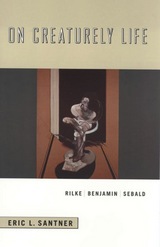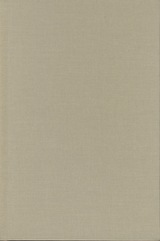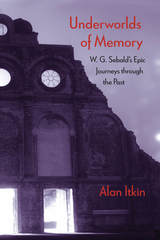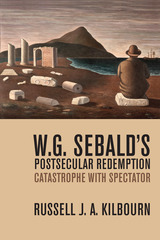4 books about Sebald, W. G. (Winfried Georg)

On Creaturely Life
Rilke, Benjamin, Sebald
Eric L. Santner
University of Chicago Press, 2006
In his Duino Elegies, Rainer Maria Rilke suggests that animals enjoy direct access to a realm of being—the open—concealed from humans by the workings of consciousness and self-consciousness. In his own reading of Rilke, Martin Heidegger reclaims the open as the proper domain of human existence but suggests that human life remains haunted by vestiges of an animal-like relation to its surroundings. Walter Benjamin, in turn, was to show that such vestiges—what Eric Santner calls the creaturely—have a biopolitical aspect: they are linked to the processes that inscribe life in the realm of power and authority.
Santner traces this theme of creaturely life from its poetic and philosophical beginnings in the first half of the twentieth century to the writings of the enigmatic German novelist W. G. Sebald. Sebald’s entire oeuvre, Santner argues, can be seen as an archive of creaturely life. For Sebald, the work on such an archive was inseparable from his understanding of what it means to engage ethically with another person’s history and pain, an engagement that transforms us from indifferent individuals into neighbors.
An indispensable book for students of Sebald, On Creaturely Life is also a significant contribution to critical theory.
Santner traces this theme of creaturely life from its poetic and philosophical beginnings in the first half of the twentieth century to the writings of the enigmatic German novelist W. G. Sebald. Sebald’s entire oeuvre, Santner argues, can be seen as an archive of creaturely life. For Sebald, the work on such an archive was inseparable from his understanding of what it means to engage ethically with another person’s history and pain, an engagement that transforms us from indifferent individuals into neighbors.
An indispensable book for students of Sebald, On Creaturely Life is also a significant contribution to critical theory.
[more]

Three Sons
Franz Kafka and the Fiction of J. M. Coetzee, Philip Roth, and W. G. Sebald
Daniel L. Medin
Northwestern University Press, 2010
Franz Kafka was a self-conscious writer whose texts were highly if mysteriously autobiographical. Three giants of contemporary fiction—J. M. Coetzee, Philip Roth, and W. G. Sebald—have all acknowledged their debt to the work of Kafka, both in interviews and in their own academic essays and articles for a general readership about him. In this striking feat of literary scholarship, Daniel Medin finds that the use of Kafka by Coetzee, Roth, and Sebald is similarly self-reflexive and autobiographical. That writers from such divergent national and ethnic traditions can have such unique critical readings of Kafka, and that Kafka could exert such a powerful influence over their oeuvres, Medin contends, attests to the central place of Kafka in the contemporary literary imagination.
[more]

Underworlds of Memory
W. G. Sebald's Epic Journeys through the Past
Alan Itkin
Northwestern University Press, 2017
Underworlds of Memory argues persuasively that the literary works of the expatriate German author W. G. Sebald can best be understood through the lens of the classical genre of epic.
Scholars often read Sebald’s work as a project of cultural memory that aims to reevaluate Europe's past in the wake of the traumatic and complex events of the twentieth century. Sebald’s characters seek out the traces of Europe’s destructive history in strange places. They linger in disused train stations, pause before works of art, and return to childhood homes that turn out to be more foreign than any place they have visited. Underworlds of Memory demonstrates that these strange encounters with the past are based on central tropes of classical epic: the journey to the underworld, the encounter with a work of art, and the return to the homeland.
Sebald thus follows in the footsteps of German Jewish authors, including Peter Weiss, Siegfried Kracauer, and Jean Améry, who use these same epic tropes to reconsider the cultural memory of the Holocaust. Underworlds of Memory reads Sebald's works together with the works of these German Jewish authors and the classical epics of Homer and Virgil in order to describe and trace the origins of the unique intervention into cultural memory they embody.
Scholars often read Sebald’s work as a project of cultural memory that aims to reevaluate Europe's past in the wake of the traumatic and complex events of the twentieth century. Sebald’s characters seek out the traces of Europe’s destructive history in strange places. They linger in disused train stations, pause before works of art, and return to childhood homes that turn out to be more foreign than any place they have visited. Underworlds of Memory demonstrates that these strange encounters with the past are based on central tropes of classical epic: the journey to the underworld, the encounter with a work of art, and the return to the homeland.
Sebald thus follows in the footsteps of German Jewish authors, including Peter Weiss, Siegfried Kracauer, and Jean Améry, who use these same epic tropes to reconsider the cultural memory of the Holocaust. Underworlds of Memory reads Sebald's works together with the works of these German Jewish authors and the classical epics of Homer and Virgil in order to describe and trace the origins of the unique intervention into cultural memory they embody.
[more]

W. G. Sebald’s Postsecular Redemption
Catastrophe with Spectator
Russell J. A. Kilbourn
Northwestern University Press, 2019
Focusing on W. G. Sebald's four works of prose fiction—The Rings of Saturn, Vertigo, The Emigrants, and Austerlitz—Russell J. A. Kilbourn traces the author's abiding preoccupation with redemption in a world that has been described as postsecular. He shows that Sebald's work stands between modernism's ironic hopes for redemption and whatever comes after. Out of the spectacle of humankind's slow-motion self-destruction, a "Sebaldian subject"—masculine, melancholic, ironic, potentially queer-emerges across the four prose narratives.
Alongside Sebald studies' traditional subjects, which include memory, historiography, Sebald's critique of an image-based culture, and his highly intermedial poetics, W. G. Sebald's Postsecular Redemption demonstrates Sebald's relevance for affect theory, new materialism, and the posthuman turn. It critiques the possibility of metaphysical or eroto-salvific models of redemption, arguing against the temptation of psychoanalytic interpretations, as Sebald's work of memory rejects the discourse of redemption in favor of restitution.
In its consideration of Sebald's place in twentieth-century literature and after, Kilbourn's book engages with such predecessors as Nabokov, Kafka, Conrad, and Beckett, concluding with comparisons with contemporaries Claudio Magris and Alice Munro.
Alongside Sebald studies' traditional subjects, which include memory, historiography, Sebald's critique of an image-based culture, and his highly intermedial poetics, W. G. Sebald's Postsecular Redemption demonstrates Sebald's relevance for affect theory, new materialism, and the posthuman turn. It critiques the possibility of metaphysical or eroto-salvific models of redemption, arguing against the temptation of psychoanalytic interpretations, as Sebald's work of memory rejects the discourse of redemption in favor of restitution.
In its consideration of Sebald's place in twentieth-century literature and after, Kilbourn's book engages with such predecessors as Nabokov, Kafka, Conrad, and Beckett, concluding with comparisons with contemporaries Claudio Magris and Alice Munro.
[more]
READERS
Browse our collection.
PUBLISHERS
See BiblioVault's publisher services.
STUDENT SERVICES
Files for college accessibility offices.
UChicago Accessibility Resources
home | accessibility | search | about | contact us
BiblioVault ® 2001 - 2024
The University of Chicago Press









